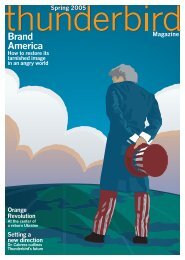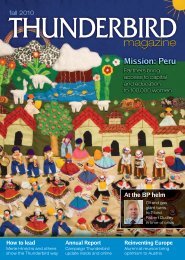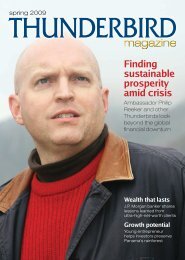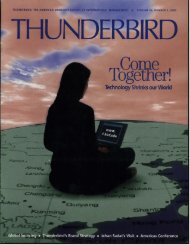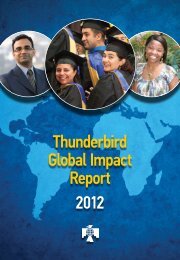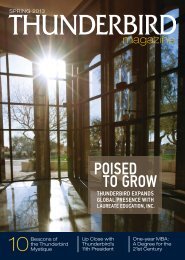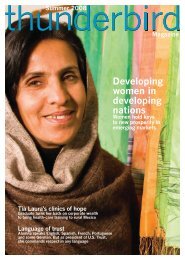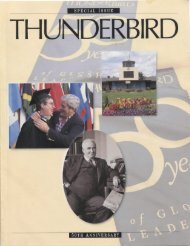Spring 11 MASTER.indd - Thunderbird Magazine
Spring 11 MASTER.indd - Thunderbird Magazine
Spring 11 MASTER.indd - Thunderbird Magazine
You also want an ePaper? Increase the reach of your titles
YUMPU automatically turns print PDFs into web optimized ePapers that Google loves.
faculty focus<br />
Einstein’s world<br />
An internationalist, and still loyal to one’s tribe?<br />
BY ROBERT T. MORAN<br />
Acclaimed physicist<br />
Albert Einstein<br />
showed a<br />
knack for global<br />
affairs in a 1919 letter to<br />
a friend. “One can be an<br />
internationalist without being<br />
indifferent to members<br />
of one’s tribe,” he wrote.<br />
Einstein was right, of<br />
course. But balancing<br />
national pride with global<br />
perspective can be tricky<br />
for business leaders in<br />
a world that has grown<br />
increasingly interconnected<br />
since Einstein’s letter more<br />
than 90 years ago.<br />
I came to <strong>Thunderbird</strong><br />
from the University of<br />
Minnesota in 1976. The International<br />
Studies Department<br />
had received a U.S.<br />
Department of Education<br />
grant to develop a program<br />
in “cross-cultural communication,”<br />
and I was asked<br />
to design courses focusing<br />
on the people, or the “soft”<br />
side of doing business.<br />
Since fall 1976, when<br />
I started teaching Cross-<br />
Cultural Communication<br />
for International Managers,<br />
more than 7,000 T-bird<br />
grads have taken this class.<br />
The theme of the course<br />
was “culture counts” or<br />
“culture matters.” I am<br />
trained as a behavioral<br />
psychologist, so I used<br />
concepts from psychology,<br />
social psychology, anthropology<br />
and sociology, as<br />
well as examples from my<br />
five years of experience living<br />
and working in Japan<br />
in the 1960s.<br />
Most students who took<br />
this class also read my<br />
book, “Managing Cultural<br />
Differences,” first published<br />
in 1979. The book<br />
had 418 pages, and the first<br />
edition had three printings.<br />
The eighth edition,<br />
published in November<br />
2010, has 570 pages with<br />
more than 200 additional<br />
pages on a website and an<br />
instructor’s guide of more<br />
than 300 pages. What<br />
follows are excerpts from<br />
Chapter 1 of the eighth<br />
edition related to Einstein’s<br />
1919 quote, and reprinted<br />
with the publisher’s permission.<br />
A FRIENDLY<br />
ENCOUNTER<br />
In our neighborhood,<br />
trash is picked up every<br />
Monday and Thursday. I<br />
was born and spent my<br />
early years in Canada,<br />
where everyone called the<br />
trash “garbage.” One of my<br />
early chores as a young boy<br />
was to take out the garbage.<br />
I still take out the<br />
garbage, usually on a<br />
Sunday night for an early<br />
Monday morning pickup.<br />
One Sunday, as I left a<br />
CONTINUED ON NEXT PAGE<br />
“Managing Cultural<br />
Differences:<br />
Leadership Skills<br />
and Strategies<br />
for Working in a<br />
Global World”<br />
Authors: Robert T. Moran,<br />
Philip R. Harris and Sarah<br />
V. Moran<br />
Publisher: Butterworth-<br />
Heinemann; 8th edition<br />
(Nov. 25, 2010)<br />
ISBN: 978-1856179232<br />
Description: Paperback,<br />
570 pages<br />
DARYL JAMES<br />
50 spring 20<strong>11</strong>




